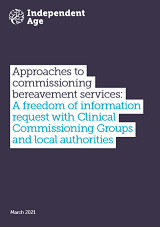Approaches to Commissioning Bereavement Services

Bereavement services are an often-hidden element of health and care services. Bereavement support rarely makes the headlines, but the COVID-19 pandemic has highlighted the essential need for this kind of support.
This briefing by the charity, Independent Age, follows a Freedom of Information request to local authorities and Clinical Commissioning Groups in Autumn 2020, asking them about their approaches to commissioning services and their knowledge of the current demand and availability of services in their area. In the first lockdown alone, they estimate that up to 98,000 older people were bereaved of a partner. And, with people experiencing traumatic bereavements and even more experiencing grief in the midst of restrictions on social contact, they suggest the reality is many more people may need to access bereavement support over the years to come.
Independent Age research survey showed that there is no clear responsibility for providing or commissioning bereavement support, with Clinical Commissioning Groups (CCGs) and local authorities (LAs) adopting different approaches in different areas. In particular, they found:
- Only a small proportion of CCGs and LAs have conducted a mapping exercise to understand what bereavement support is available in their local area.
- Many CCGs and LAs have not provided any financial support to provide or commission bereavement support in their local area.
- Only a small minority of CCGs and LAs have invested extra money for bereavement support during the pandemic, despite COVID-19 meaning many more people will be at risk of developing complicated grief.
With COVID-19 in mind, they are calling on the government must start to provide strategic oversight of the bereavement sector through a cross-department bereavement strategy led by the Department of Health and Social Care with NHS England producing clearer guidance for CCGs on how to commission bereavement support services.
